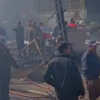More than 6,000 South Sudanese refugees have left one of Kenya’s biggest refugee camps, the United Nations told AFP Thursday, as aid cuts force increasing food shortages.
The Kakuma refugee camp in northern Kenya is the east African nation’s second-largest and hosts roughly 300,000 people from South Sudan, Somalia, Uganda and Burundi.
Humanitarian groups are struggling, with violent protests breaking out last month due to reduced rations following massive cuts to aid from the United States and other donors.
Desperately poor South Sudan has struggled with years of instability and is currently on the verge of renewed civil war, driving refugees over the border.
“Since January, about 6,200 South Sudanese refugees have departed Kakuma and Kalobeyei,” another settlement adjoining it, the UN’s refugee agency (UNHCR) said in a statement emailed to AFP.
Between July and August 22 alone roughly 3,600 people — mainly women and children — left the sprawling camp, it said, “accounting for over half of all exits this year”.
“Actual numbers are likely higher, as many movements happen through informal crossings,” it said.
It added that the departures came in the context of “some 4,800 new arrivals” since January, however.
– Food aid cuts –
The UNHCR stressed that while the movements suggested a “developing trend”, the “departures cannot be attributed to one factor alone”.
However, the body noted the major shift began in July as the World Food Programme (WFP) began reducing rations, categorising refugees under a four-tier scale and limiting assistance to the two worst-off groups.
“Some refugees have expressed concerns about food assistance categorisation,” the UNHCR said, as well as the recent unrest.
“While the scale of recent movements is notable, such cross-border mobility is not new,” it stressed, adding that it would continue to “monitor the situation closely”.
“What we are witnessing is a direct result of global funding shortfalls,” the WFP said in a statement on X earlier on Thursday.
“Unless resources are urgently mobilised, more refugees will be forced into impossible choices: either endure hunger in camps or return to fragile situations back home,” it added.
An official with the Department for Refugee Services (DRS) in Kakuma, who asked not to be named as he was not permitted to speak with the press, told AFP many were returning to South Sudan.
And while many South Sudanese in Kakuma were known to leave and return, he said the current movements were “unusual”.
“It was orchestrated by the categorisation,” he said, a reference to the new assistance programme, noting that some of the South Sudanese community in Kakuma fell into the categories that did not qualify for aid.
“They have nothing to eat,” he said.





